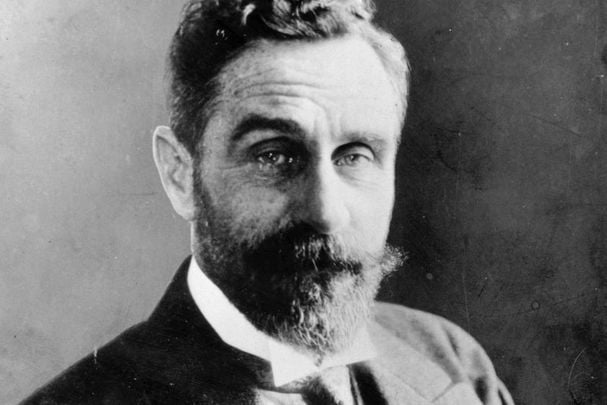Top Stories
Sir Roger Casement Executed: Remembering the Easter Rising Rebel

UPDATE: Today marks the 107th anniversary of the execution of Sir Roger Casement, a figure synonymous with the 1916 Easter Rising in Ireland. Casement was executed in Pentonville Prison, London, on August 3, 1916, after his pivotal role in the rebellion against British rule.
Casement’s journey from a celebrated knight to a convicted traitor underscores the intense political turmoil of the time. Just five years prior, he received a knighthood for exposing human rights abuses in Africa and South America. His experiences shaped his views against imperialism, leading him to embrace the Irish nationalist movement.
Born on September 1, 1864, in Sandycove, Co Dublin, Casement’s early life was steeped in privilege. However, his time in the British Colonial Service opened his eyes to the brutal realities of colonial exploitation. His 1904 Congo Report revealed horrific abuses, thrusting him into the public spotlight and igniting his passion for social justice.
As World War I unfolded, Casement sought support for the Irish cause from Germany, believing it was the key to Ireland’s independence. He traveled to Germany, where he attempted to rally Irish POWs and secure weapons for the Rising. However, his plans faced skepticism from leaders within the Irish movement, including Thomas Clarke, who questioned Casement’s motivations and allegiance.
On Easter Sunday, 1916, confusion reigned when plans for the uprising were disrupted, shifting the timeline to Easter Monday. Despite initial opposition, Casement arrived in Ireland via a German U-boat but was captured upon landing at Banna Strand in County Kerry. His mission ended in disaster as British forces intercepted his arms shipment, leading to his trial for treason.
During his trial at the Old Bailey, Casement delivered a passionate defense, stating, “Where all your rights become only an accumulated wrong… then surely it is a braver, a saner, and a truer thing to be a rebel in act and deed against such circumstances.” Despite appeals for clemency from notable figures like W.B. Yeats and George Bernard Shaw, Casement was sentenced to death.
The revelation of the controversial Black Diaries, allegedly detailing Casement’s private life, further fueled public disdain, overshadowing calls for mercy. On the day of his execution, Casement converted to Catholicism, becoming the last of the 1916 rebels to be hanged and the only one executed outside Ireland.
Casement’s legacy remains contentious, with ongoing debates regarding the authenticity of the Black Diaries. In 1965, his remains were returned to Ireland, culminating in a state funeral attended by prominent figures, including President Eamon de Valera.
Casement’s story is a poignant reminder of the complexities of national identity and the personal sacrifices made in the pursuit of freedom. As poet W.B. Yeats articulated, “The ghost of Roger Casement is beating on the door.”
As we reflect on this significant historical moment, it’s essential to recognize the ongoing relevance of Casement’s fight for justice and equality. His life serves as both an inspiration and a cautionary tale for future generations.
For those interested in learning more, stay connected and share your thoughts on Casement’s enduring impact on Irish history.
-

 Top Stories3 months ago
Top Stories3 months agoTributes Surge for 9-Year-Old Leon Briody After Cancer Battle
-

 Entertainment4 months ago
Entertainment4 months agoAimee Osbourne Joins Family for Emotional Tribute to Ozzy
-

 Politics4 months ago
Politics4 months agoDanny Healy-Rae Considers Complaint After Altercation with Garda
-

 Top Stories4 months ago
Top Stories4 months agoIreland Enjoys Summer Heat as Hurricane Erin Approaches Atlantic
-

 World5 months ago
World5 months agoHawaii Commemorates 80 Years Since Hiroshima Bombing with Ceremony
-

 Top Stories3 months ago
Top Stories3 months agoNewcastle West Woman Patricia Foley Found Safe After Urgent Search
-

 Top Stories5 months ago
Top Stories5 months agoFianna Fáil TDs Urgently Consider Maire Geoghegan-Quinn for Presidency
-

 World5 months ago
World5 months agoCouple Convicted of Murdering Two-Year-Old Grandson in Wales
-

 World5 months ago
World5 months agoGaza Aid Distribution Tragedy: 20 Killed Amid Ongoing Violence
-

 World5 months ago
World5 months agoAristocrat Constance Marten and Partner Convicted of Infant Murder
-

 Top Stories4 months ago
Top Stories4 months agoClimbing Errigal: A Must-Do Summer Adventure in Donegal
-

 Top Stories4 months ago
Top Stories4 months agoHike Donegal’s Errigal Mountain NOW for Unforgettable Summer Views









